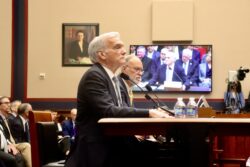Sivagami Subbaraman is the first director of Georgetown’s new LGBTQ Resource Center. Raised in India, she came to the United States to study English and Women’s Studies at the University of Illinois, Champaign-Urbana. Before coming to Georgetown, she worked as the associate director of the University of Maryland’s Office of LGBT Equality.
You came here from Maryland. What did you learn at Maryland about running a resource center? Did you learn any lessons that you’ll apply here at Georgetown?
I think I bring to this work more than 20 years of experience doing general diversity-related work. I’ve done a lot of work around gender. I taught some of the first women’s studies classes in this country in the early 80s. That’s my background, actually, Women’s Studies and African American literature.

What inspired you to switch from women’s studies to LGBTQ issues?
I don’t see it as a switch at all. I think what feminism is about is gender, and LGBTQ issues are about gender. So to me it’s a natural progression. They are all social justice issues, and I’ve always been a social justice educator. And I see sexual orientation as very much part and parcel of all other identities. I think our problem is we often reduce it to the lowest common denominator.
What resources will the Center have? I know it’s early, but what sort of things will be available here?
I really hope the center will be a place for both LGBTQ students, faculty, and staff, as well as non-LGBTQ people to come together, to have conversations about what they would like to see happen here. In terms of specific resources, I’m hoping that I will be able to set up some sort of dialogue programs, and diversity trainings for professional staff as well as students. I really have committed to doing peer education, so I want to be able to teach a class, a peer education class, to train students and allies to go and be peer educators in various classrooms, other groups, and so on. I’m really committed to working collaboratively with other departments on campus as well as other student groups, because I really believe that LGBTQ people are everywhere. We’re not just LGBTQ people, we’re also Asians, we’re also Latino, we’re also white, we’re black, we’re women, we’re men, we’re tall, we’re short.
Last year, in the drive to get the resource center, GU Pride resorted to some unorthodox tactics—disrupting tour groups, marching on the president’s office. Do you approve of that sort of thing, or will you work with them to work through different avenues?
I have no clue. I can’t comment on what they did last year. I think in general for many of these social justice issues the model that prevails is activism: the kind you’re describing is one form of activism. I think there are very few models for students to have a more complex understanding of how activism can be leadership.
I’m hoping to have conversations with the various student groups to see how different groups can work together to create other forms of leadership that will take us from the activist mode—which is important—but something we have to review and see what else we need to get done, and how we’re going to build.
So for me, the center now exists. I am the beneficiary, in many ways, as I see it, of the very hard work that other people have done all these years. And perhaps under more difficult circumstances. But right now I feel the university is committed to making this succeed.
The Resource Center was a big tangible goal for the LGBTQ community for a long time. What do you think is next, as far as concrete goals?
I don’t know. That’s a conversation I’m going to go back and have with all the working groups. But I do know that Rosemary Kilkenny is planning to have a campus-wide advisory committee of some sort on LGBTQ issues, that will perhaps serve as an advisory board or committee for the campus.
Have you had any conversations with gay faculty members, and how do they feel about the center?
They are thrilled to bits. I think partly because I also come from a faculty background. I’ve spoken to several of them, and they are really hopeful that the Center will then serve—once there is a Center, there is a possibility to leverage things happening on the campus.
Like I said, I think hopefully the center will be a place where all people can come, all constituent groups. My immediate focus and attention is going to be the students, but that is not going to be the only purpose of the Center. I hope the Center will have a larger campus-wide role in how LGBTQ issues are perceived in context of other work around campus on diversity.
-Interview by Will Sommer





